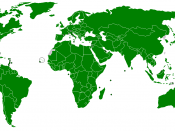Roles of International Financial Institutions
In July 1944, following the end of World War II, several countries met in New Hampshire, United States to devise a way to better manage postwar reconstruction efforts as well as expansion of the global capitalist economy. Out of this meeting, two international financial institutions were created, the World Bank, originally named The International Bank for Reconstruction and Development, and the International Monetary Fund. In addition, several regional institutions such as the Asian Development Bank have emerged in recent years to address the specific needs of countries in a specific region of the world.
The International Monetary Fund, commonly referred to as IMF, is a multinational organization comprised of approximately 184 member countries with headquarters in Washington, D.C. The IMF website states the role of the IMF is to "promote international monetary cooperation, exchange stability, and orderly exchange arrangements; to foster economic growth and high levels of employment; and to provide temporary financial assistance to countries to help ease balance of payments adjustment (IMF.org,
2005)." Because its purpose involves maintaining funds that member countries can use to balance monetary inequities, the IMF is considered the 'central institution' of the international monetary system.
The Asian Development Bank or ADB with current headquarters in Manila was established in 1966. There are currently 63 member countries, primarily located in the Asian and Pacific regions of the world, but also including countries such as the United States, Germany, United Kingdom, and Canada among others. The primary functions of the ADB include:
extends loans and equity investments to its developing member countries (DMCs) for their economic and social development
provides technical assistance for the planning and execution of development projects and programs and for advisory services
promotes and facilitates investment of public and private capital for development, and
responds to...


